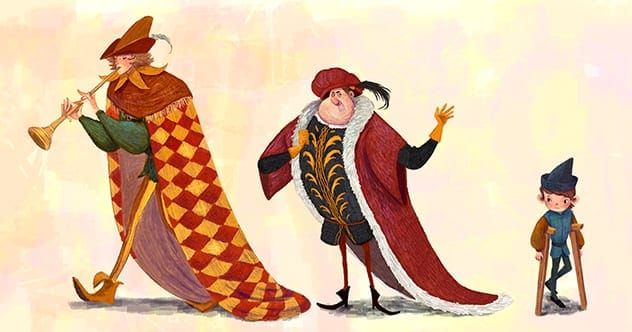Once upon a time, fairytales weren’t just for kids. They held valuable lessons that guided societies. Today, we can still learn a lot from these classic stories. Let’s explore ten fairytales and the morals they offer us.
Three Little Pigs
The Story: Three pigs build houses of straw, sticks, and bricks. The wolf easily destroys the first two, but the brick house withstands his attack. The wolf tries to enter through the chimney but falls into a pot of boiling water.
The Lesson: Hard work and preparation pay off. Shortcuts might seem easier, but they don’t offer lasting security.
Modern-day Application: In today’s world, this translates to taking care of ourselves. Effort in exercise, proper nutrition, and continuous learning builds a strong foundation, just like the brick house. Ignoring these can leave us vulnerable when challenges arise. Are we really surprised that countries with higher obesity rates had higher COVID-19 death tolls?
Little Red Riding Hood
The Story: A girl ignores her mother’s warning and talks to a wolf, revealing her grandmother’s location. The wolf disguises himself as the grandmother and tricks Little Red Riding Hood, but a woodsman saves her.
The Lesson: Be cautious and don’t trust strangers blindly.
Modern-day Application: We are constantly bombarded with information, and it’s crucial to discern truth from falsehood. The inability to recognize hidden motives fuels polarization in society. Developing a strong “bullshit detector” is essential to navigate today’s complex world.
The Boy Who Cried Wolf
The Story: A shepherd boy repeatedly lies about a wolf attacking the sheep, and when a wolf actually appears, no one believes him.
The Lesson: Honesty is crucial. If you lie, people will lose trust in you, even when you’re telling the truth.
Modern-day Application: Society often displays cynicism due to repeated lies by officials. This widespread distrust makes it difficult to distinguish truth from lies, leading to apathy and disengagement. Maintaining integrity is vital in all aspects of life.
Jack and the Beanstalk
The Story: Jack trades a cow for magic beans, climbs a giant beanstalk, steals from a giant, and eventually kills him.
The Lesson: While it can be seen as taking advantage of opportunities, a better lesson is not to be greedy. Jack wasn’t satisfied despite his repeated thefts.
Modern-day Application: Our society is obsessed with wanting more, from corporations prioritizing profits to individuals chasing material possessions. Focusing solely on accumulating wealth while neglecting personal values leads to moral bankruptcy. Strive for balance and contentment.
The Ugly Duckling
The Story: A duckling is considered ugly and ostracized until it grows into a beautiful swan.
The Lesson: Don’t judge based on appearances or differences. What seems unattractive may have hidden beauty or potential.
Modern-day Application: Judging people for their differences is akin to cancel culture. The lack of forgiveness and tolerance affects society. Tribalism, whether excluding people for identity politics or scapegoating minorities, is inherently damaging.
Chicken Little
The Story: After an acorn falls on Chicken Little’s head, he believes the sky is falling, causing widespread panic.
The Lesson: Don’t catastrophize every minor setback; it’s alarmist and irrational.
Modern-day Application: Sensationalized media and exaggerations are everywhere, especially on social media. We shouldn’t create world-ending crises out of every insignificant event. Maintain perspective and avoid jumping to conclusions. Remember CNN’s fake cockpit during the missing airplane coverage?
The Emperor’s New Clothes
The Story: An emperor is tricked into believing he’s wearing magnificent clothes that are invisible to fools. Everyone pretends to see them until a child points out the emperor is naked.
The Lesson: Don’t let fear of rebuke prevent you from speaking the truth.
Modern-Day Application: The reluctance to denounce extreme viewpoints has led to cancel culture and identity politics. The fear of speaking out against the absurd prevents people from stating an obvious truth. Like James Carville said, “Wokeness is a problem and everyone knows it… But they don’t want to say it out loud.”
The Pied Piper
The Story: A piper rids a town of rats but is cheated of his payment. In revenge, he lures the town’s children away.
The Lesson: Keep your promises and honor agreements. If you don’t, there will be consequences.
Modern-day Application: Society has lost the ability to understand cause and effect. Outsourcing jobs and automating tasks creates resentment, and leaders shouldn’t complain when the people elect someone who champions them. Treating people with fairness and decency minimizes backlashes.
The Three Billy Goats Gruff
The Story: Three goats outsmart a troll under a bridge to reach a grassy hill.
The Lesson: Pick your battles wisely. If someone else is better equipped to handle a threat, let them.
Modern-day Application: The increased combativeness is due to an inability to stay out of conflicts. Whether virtue-signaling celebrities or know-it-all students, everyone thinks they need to die on every hill. Realizing one’s place and expertise can smooth societal frictions.
The Princess and the Pea
The Story: A princess’s sensitivity to a pea under a stack of mattresses proves her royal lineage.
The Lesson: It’s debatable, but it highlights the ridiculousness of extreme purity tests.
Modern-day Application: Do we want to live in a world where minor “triggers” are heavily policed? Safe spaces and guilt-tripping exercises in schools resemble the pea-under-the-mattress test. Focus on inclusivity and understanding, not hyper-sensitivity.
These fairytales, though centuries old, offer timeless lessons applicable to our modern lives. They encourage us to work hard, be honest, exercise caution, avoid greed, embrace differences, and maintain perspective.
What are your favorite fairytales and the morals you’ve learned from them? Leave your comments below!










